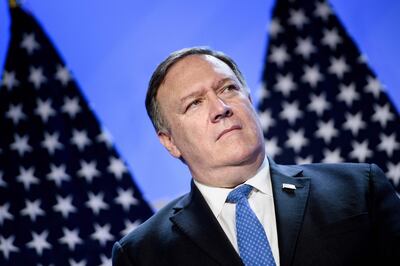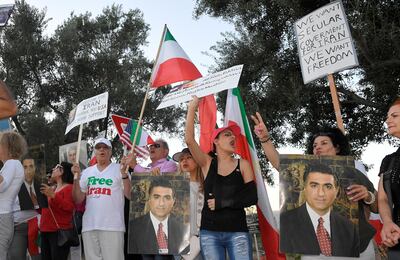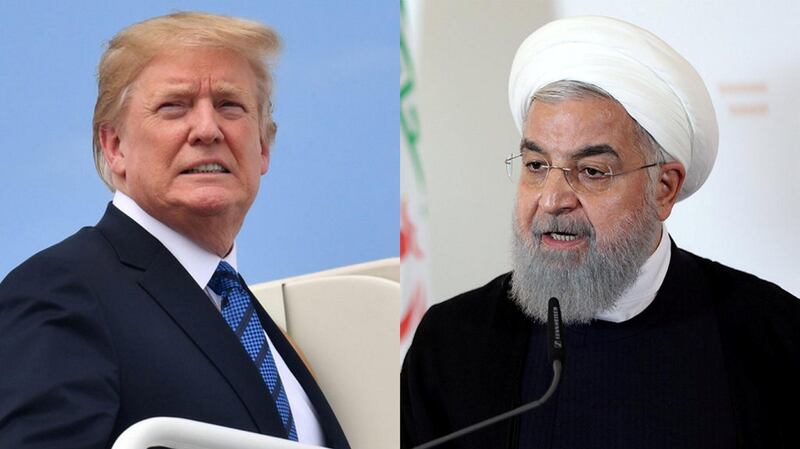US President Donald Trump sent a stark warning to Iran over threats on Sunday evening as Secretary of State Mike Pompeo accused Tehran of running a mafia-like state of repression, corruption and terrorism.
Iran President Hassan Rouhani cautioned Trump on Sunday about pursuing hostile policies against Tehran, saying: "War with Iran is the mother of all wars." But he did not rule out peace between the two countries, who have been at odds since the 1979 Islamic Revolution.
"You are not in a position to incite the Iranian nation against Iran's security and interests," Mr Rouhani said, in an apparent reference to reports of efforts by Washington to destabilise Iran's Islamic government by re-imposing sanctions.
President Trump responded to Rouhani in a tweet late on Sunday, saying:
Mr Trump's tweets came just hours after Mr Pompeo gave a speech to a largely Iranian-American audience in California in which he said Iran is "run by something that resembles the mafia more than a government” and accused Tehran of “squandering the wealth of its people”.
"The regime in Iran has been a nightmare for the Iranian people," Mr Pompeo told an audience of about thousand people. "The Trump administration dreams the same dream that the Iranian diaspora does... this dream will come true".
Mr Pompeo's speech was the latest step in a communications offensive launched by the Trump administration that is meant to foment unrest in Iran and help pressure its government to end its nuclear program and support of militant groups, US officials familiar with the matter said.
Mr Pompeo accused the regime of being controlled by ideologues, of running on authoritarianism at home and “a campaign of violence abroad.”
He cited high levels of corruption within the Iranian leadership. “The average Hezbollah fighter makes two to three times what an Iranian firefighter makes in the streets of Iran”, he said, adding that “a third of Iranian youth are unemployed while the regime lines its own pocket.”

A senior US official told reporters that Iran has spent over $16 billion supporting the Syrian regime and its proxies in Iraq and in Yemen, and “it has also given $700 million a year to Lebanese Hezbollah” and “$4 billion in lines of credit to the Assad regime.”
Mr Pompeo singled out Ayatollah Sadegh Larijani, the head of Iranian judiciary, sanctioned by the US and whose net worth he said is "at least $300 million."
"The Ayatollahs are more concerned with riches than religion" the US chief diplomat, accusing the Iranian supreme leader Ayatollah Ali Khamenei of running his "own personal hedge fund worth $90 billion, untaxed, used as a slush fund for IRGC."
Asked if the Trump administration would engage the Iranian leadership, Mr Pompeo hinted that Washington would be “willing to have a conversation” but only if the leadership in Iran makes a strategic decision of undertaking “tangible and meaningful change.”
He added that "if we can get the leadership to change...we are prepared to make this conversation...but not until irreversible change happens."
___________
Read more:
US launches war of words against Iran
Iran says it has no plans to pull out of Syria
Pompeo priorities ‘Iran threats’ in meeting with Saudi FM
___________
The goal of the Trump policy is to deny Iran "funds for instability" Mr Pompeo said, referencing Iran’s cyber-attacks, threats to Gulf security, and the latest terror plot that was exposed in Vienna.
Mr Pompeo announced that the US government was launching a 24/7 Persian language channel to reach Iranians. He also commended the courage of those protesting in the country since last December.

Suzanne Maloney, the deputy director of the Foreign Policy programme at the Brookings Institution where she focuses on Iran, said the speech was "serviceable with a few good lines” but overall “underwhelming.”
Ms Maloney told The National that Mr Pompeo's reference to the pay difference between Hezbollah militants and Iranian firefighters was a "genius" move, "considering the residual outrage over a fire at a historic building in Tehran in January 2017 that killed a dozen or more firefighters."
However, the expert noted some of the mispronunciations of Iranian names and references were “excruciating”.
"Secretary Pompeo made a tepid case for new negotiations with Iran” built on president Trump’s view that he expects Tehran to come back to the table.
But the expert argued that “it's inconceivable that the Iranian leadership will embrace a new diplomatic overture toward Washington in the wake of Mr Trump's scuttling of a previously negotiated agreements.”
Mr Trump withdrew from the Iran nuclear deal last May, and US sanctions are expected to snap back on Tehran in two waves, the first on August 6, and the second in early November.






